【BBC六分钟英语】为什么我们要扔掉这么多技术?
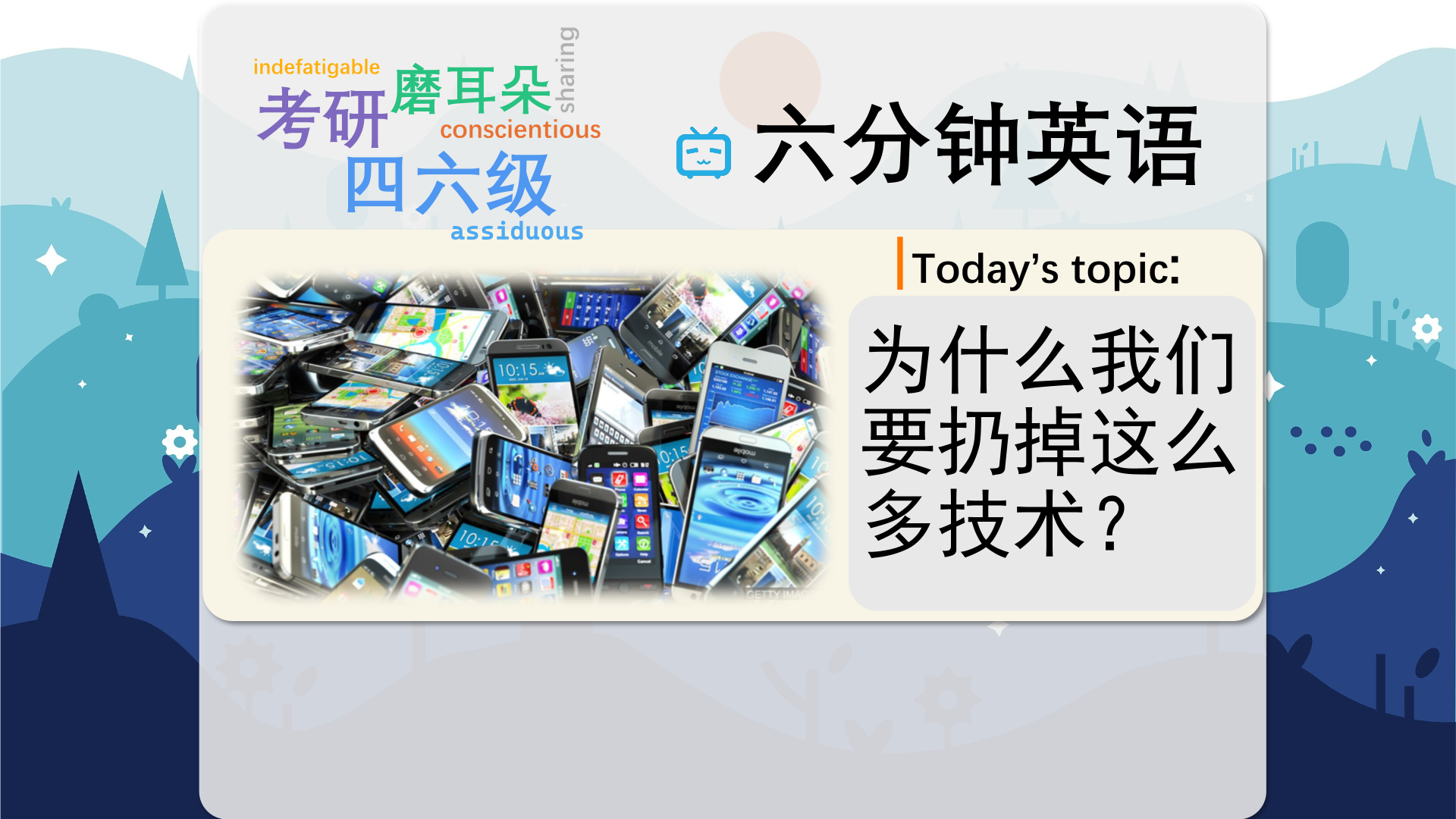
【英文脚本】
Neil
Welcome to 6 Minute English, where we bring you an interesting topic and six items of vocabulary.
Catherine
And all in just six minutes, of course. I’m Catherine.
Neil
And I’m Neil. Today – is technology built to fail? And are we throwing away too much technology and harming the planet? Catherine, tell me - how old is your TV?
Catherine
My TV has just had its fifth birthday.
Neil
And your mobile phone?
Catherine
It’s about two and a half.
Neil
So you do like to have gizmos, but not necessarily the latest.
Catherine
Exactly.
Neil
Gizmo – nice word. A gizmo is a small piece of technology – otherwise called a gadget.
Catherine
And of course I’m not alone in buying gadgets from time to time. They actually keep on getting more advanced – so people keep buying new ones.
Neil
Technology also gets cheaper and cheaper. In fact, many gadgets are more expensive to fix than replace.
Catherine
And this means that we throw a lot of gadgets away – but how many?
Neil
See if you can guess: how much electronic waste is thrown away every year globally? Is it… a) 420 tonnes, b) 4.2 million tonnes or c) 42 million tonnes?
Catherine
And I do actually know the answer to this once, so I’m gonna keep quiet, just for once!
Neil
Ah, first time for everything! So, to bring us back to our main point. Is technology no longer built to last? Let’s hear first from Professor Tim Cooper who is an expert in sustainable consumption and production at Nottingham Trent University in the UK.
Catherine
Sustainable, by the way, means ‘able to continue over a long period of time’. We often use it to mean ‘able to continue without causing harm’ – like environmental damage. What’s the problem with mobile phones?
Tim Cooper, Professor of Sustainable Consumption and Production at Nottingham Trent University
The classic example of this is the mobile phone, where, for example, screens are glued into the product. Now they know that if there was a screw there, the consumer could easily, when that screen cracks, which is obviously a very common problem with mobile phones, unscrew it and put a new screen on. They don’t. They know perfectly well that that would be a way in which mobile phones would last longer. They don’t want that, they want you to replace your mobile phone every year or two.
Neil
Professor Cooper says that mobile phones’ screens crack often – and generally when that happens people buy a new one.
Catherine
That’s partly because mobile phones’ screens are glued on rather than screwed on. Now a screw is a piece of metal like a nail but with a raised twisted part – and we use screws to join two things together.
Neil
The verb form is the same – to screw – and the opposite is to unscrew. If you could unscrew a cracked screen and then replace it, there’d be no need to buy a whole new phone, he says.
Catherine
He thinks that generally, people have lowered their expectations when it comes to how long things should last.
Neil
Expectations is a good word – an expectation is a strong belief something will happen. Expectations can be raised or lowered.
Catherine
Or managed – to ‘manage your expectations’ means to not let your expectations get so high that you then become disappointed when something fails.
Neil
Yes, by way of an example, Professor Cooper says that his parents’ washing machine lasted for 37 years. These days, they last between five and ten.
Catherine
Yeah. And we don’t see electrical products as an investment in the same way that people used to. We now worry that what we buy today will become obsolete tomorrow.
Neil
Obsolete – no longer valid or useful. And also – he says we’ve become so used to cheap products that we don’t want to spend more on good quality.
Catherine
So what’s to be done?
Neil
Cooper suggests that if we can afford it, we really should try to buy higher quality products. And manufacturers should put labels on their products saying how long they are designed to last.
Catherine
An interesting idea. Cooper says that over 2m pounds worth of electrical goods are thrown away each year in the UK. He calls it a “throwaway culture”.
Neil
A culture in which we throw things out much more easily. Not good for the planet either. So – will you try to keep your mobile for a bit longer, or are you already tempted by the latest model, Catherine?
Catherine
I’m happy with the one I’ve got, but I’m gonna protect the screen very carefully.
Neil
Yes, a good idea. Maybe this will help you make up your mind, though. I asked how many tonnes of electrical waste are thrown away globally.
Catherine
And I said I know the answer – it’s actually 42m tonnes, according to a UN report back in 2015. The figure could be a lot higher now. And as you know – my mobile isn’t very heavy – so 42m tonnes is an awful lot of phones! While we try to picture that, let’s quickly run through today’s vocabulary. So first up was gizmo - a small piece of technology – a gadget.
Neil
Smartphones, smart watches, fitness trackers, sat navs – all gizmos!
Catherine
We had sustainable – able to last or continue. We talk about sustainable energy, sustainable economic development…
Neil
The opposite would be unsustainable development… And another pair of words – to screw and to unscrew.
Catherine
A screw is that little metal thing like a nail that we use to join things together. You can screw shelves into the wall, you can screw furniture together…
Neil
And when you move house you unscrew it. Three more: to lower your expectations. What have you lowered your expectations about?
Catherine
Err, so many things… Becoming a millionaire - I don’t think that’s going to happen. Or I could say a company has lowered its expectations about performance over the next five years.
Neil
Yes – another one looking ahead into the future – I’m pretty sure my computer will be obsolete in ten years. It will no longer be used – it will be out of date.
Catherine
I just urge you, Neil, when you do get a new one – please recycle this one responsibly. We already live in a throwaway culture.
Neil
Yes – it’s pretty unsustainable. Now, before your laptop or phone becomes obsolete – I suggest you check out our Facebook, Twitter, Instagram and YouTube pages! Bye for now.
Catherine
Bye!
【中英文双语脚本】
Neil(尼尔)
Welcome to 6 Minute English, where we bring you an interesting topic and six items of vocabulary.
欢迎来到六分钟英语,我们为您带来一个有趣的话题和六个词汇。
Catherine(凯瑟琳)
And all in just six minutes, of course. I’m Catherine.
当然,所有这些都在短短六分钟内完成。我是 Catherine。
Neil(尼尔)
And I’m Neil. Today – is technology built to fail? And are we throwing away too much technology and harming the planet? Catherine, tell me - how old is your TV?
我是 Neil。今天 – 技术是注定要失败的吗?我们是否丢弃了太多技术并损害了地球?Catherine,告诉我 - 你的电视有多旧了?
Catherine(凯瑟琳)
My TV has just had its fifth birthday.
我的电视刚刚度过了它的五岁生日。
Neil(尼尔)
And your mobile phone?
你的手机呢?
Catherine(凯瑟琳)
It’s about two and a half.
大约是两点半。
Neil(尼尔)
So you do like to have gizmos, but not necessarily the latest.
所以你确实喜欢 gizmos,但不一定是最新的。
Catherine(凯瑟琳)
Exactly.
完全。
Neil(尼尔)
Gizmo – nice word. A gizmo is a small piece of technology – otherwise called a gadget.
Gizmo – 好词。小工具是一种小技术 – 也称为小工具。
Catherine(凯瑟琳)
And of course I’m not alone in buying gadgets from time to time. They actually keep on getting more advanced – so people keep buying new ones.
当然,我并不孤单地不时购买小工具。它们实际上一直在变得越来越先进 - 所以人们不断购买新的。
Neil(尼尔)
Technology also gets cheaper and cheaper. In fact, many gadgets are more expensive to fix than replace.
技术也变得越来越便宜。事实上,许多小工具的修理成本高于更换成本。
Catherine(凯瑟琳)
And this means that we throw a lot of gadgets away – but how many?
这意味着我们扔掉了很多小工具 —— 但有多少呢?
Neil(尼尔)
See if you can guess: how much electronic waste is thrown away every year globally? Is it… a) 420 tonnes, b) 4.2 million tonnes or c) 42 million tonnes?
看看你是否能猜到:全球每年扔掉多少电子垃圾?是吗。。。a) 420 吨,b) 420 万吨还是 c) 4200 万吨?
Catherine(凯瑟琳)
And I do actually know the answer to this once, so I’m gonna keep quiet, just for once!
我确实知道这个问题的答案一次,所以我要保持沉默,就这一次!
Neil(尼尔)
Ah, first time for everything! So, to bring us back to our main point. Is technology no longer built to last? Let’s hear first from Professor Tim Cooper who is an expert in sustainable consumption and production at Nottingham Trent University in the UK.
啊,一切都是第一次!所以,让我们回到我们的主要观点。技术是否不再经久耐用?让我们先听听英国诺丁汉特伦特大学可持续消费和生产专家 Tim Cooper 教授的发言。
Catherine(凯瑟琳)
Sustainable, by the way, means ‘able to continue over a long period of time’. We often use it to mean ‘able to continue without causing harm’ – like environmental damage. What’s the problem with mobile phones?
顺便说一句,可持续意味着“能够持续很长时间”。我们经常用它来表示“能够在不造成伤害的情况下继续” —— 比如环境破坏。手机有什么问题?
Tim Cooper, Professor of Sustainable Consumption and Production at Nottingham Trent University(TimCooper,诺丁汉特伦特大学可持续消费和生产教授)
The classic example of this is the mobile phone, where, for example, screens are glued into the product. Now they know that if there was a screw there, the consumer could easily, when that screen cracks, which is obviously a very common problem with mobile phones, unscrew it and put a new screen on. They don’t. They know perfectly well that that would be a way in which mobile phones would last longer. They don’t want that, they want you to replace your mobile phone every year or two.
这方面的经典例子是手机,例如,屏幕被粘在产品中。现在他们知道,如果那里有螺丝,当屏幕破裂时,消费者可以很容易地拧开它并戴上新的屏幕,这显然是手机的一个非常常见的问题。他们没有。他们非常清楚,这将使手机的使用寿命更长。他们不希望那样,他们希望您每隔一两年更换一次手机。
Neil(尼尔)
Professor Cooper says that mobile phones’ screens crack often – and generally when that happens people buy a new one.
Cooper 教授说,手机的屏幕经常破裂 —— 通常当这种情况发生时,人们会购买新的。
Catherine(凯瑟琳)
That’s partly because mobile phones’ screens are glued on rather than screwed on. Now a screw is a piece of metal like a nail but with a raised twisted part – and we use screws to join two things together.
部分原因是手机的屏幕是粘在上面的,而不是拧上去的。现在,螺丝是一块像钉子一样的金属,但有一个凸起的扭曲部分 —— 我们使用螺丝将两样东西连接在一起。
Neil(尼尔)
The verb form is the same – to screw – and the opposite is to unscrew. If you could unscrew a cracked screen and then replace it, there’d be no need to buy a whole new phone, he says.
动词形式是相同的 – to screw – 反之是 to unscrew。他说,如果你能拧开破裂的屏幕,然后更换它,就没有必要购买全新的手机。
Catherine(凯瑟琳)
He thinks that generally, people have lowered their expectations when it comes to how long things should last.
他认为,一般来说,当谈到事情应该持续多长时间时,人们会降低他们的期望。
Neil(尼尔)
Expectations is a good word – an expectation is a strong belief something will happen. Expectations can be raised or lowered.
期望是一个好词 —— 期望是对某事会发生的强烈信念。期望值可以提高或降低。
Catherine(凯瑟琳)
Or managed – to ‘manage your expectations’ means to not let your expectations get so high that you then become disappointed when something fails.
或管理 —— “管理你的期望”意味着不要让你的期望变得太高,以至于当某件事失败时你会感到失望。
Neil(尼尔)
Yes, by way of an example, Professor Cooper says that his parents’ washing machine lasted for 37 years. These days, they last between five and ten.
是的,举个例子,库珀教授说他父母的洗衣机用了 37 年。如今,它们持续 5 到 10 次。
Catherine(凯瑟琳)
Yeah. And we don’t see electrical products as an investment in the same way that people used to. We now worry that what we buy today will become obsolete tomorrow.
是的。而且,我们不再像过去那样将电气产品视为一种投资。我们现在担心我们今天购买的东西明天就会过时。
Neil(尼尔)
Obsolete – no longer valid or useful. And also – he says we’ve become so used to cheap products that we don’t want to spend more on good quality.
过时 – 不再有效或有用。而且 - 他说我们已经习惯了廉价产品,以至于我们不想在优质产品上花更多钱。
Catherine(凯瑟琳)
So what’s to be done?
那么该怎么办呢?
Neil(尼尔)
Cooper suggests that if we can afford it, we really should try to buy higher quality products. And manufacturers should put labels on their products saying how long they are designed to last.
Cooper 建议,如果我们负担得起,我们真的应该尝试购买更高质量的产品。制造商应该在他们的产品上贴上标签,说明它们的设计使用寿命。
Catherine(凯瑟琳)
An interesting idea. Cooper says that over 2m pounds worth of electrical goods are thrown away each year in the UK. He calls it a “throwaway culture”.
一个有趣的想法。Cooper 说,在英国,每年有超过 2m 磅的电子产品被丢弃。他称之为“一次性文化”。
Neil(尼尔)
A culture in which we throw things out much more easily. Not good for the planet either. So – will you try to keep your mobile for a bit longer, or are you already tempted by the latest model, Catherine?
在这种文化中,我们更容易把东西扔掉。对地球也不好。那么 - 您会尝试将手机保留更长时间,还是已经被最新型号 Catherine 所吸引?
Catherine(凯瑟琳)
I’m happy with the one I’ve got, but I’m gonna protect the screen very carefully.
我对我拥有的那个很满意,但我会非常小心地保护屏幕。
Neil(尼尔)
Yes, a good idea. Maybe this will help you make up your mind, though. I asked how many tonnes of electrical waste are thrown away globally.
是的,一个好主意。不过,也许这会帮助你下定决心。我问全球有多少吨电力垃圾被丢弃。
Catherine(凯瑟琳)
And I said I know the answer – it’s actually 42m tonnes, according to a UN report back in 2015. The figure could be a lot higher now. And as you know – my mobile isn’t very heavy – so 42m tonnes is an awful lot of phones! While we try to picture that, let’s quickly run through today’s vocabulary. So first up was gizmo - a small piece of technology – a gadget.
我说我知道答案 —— 根据 2015 年的联合国报告,它实际上是 42m 吨。现在这个数字可能会高得多。如您所知 – 我的手机不是很重 – 所以 42m 吨的手机数量真是太多了!在我们试图描绘这一点的同时,让我们快速浏览一下今天的词汇。所以首先是 gizmo - 一个小技术 - 一个小工具。
Neil(尼尔)
Smartphones, smart watches, fitness trackers, sat navs – all gizmos!
智能手机、智能手表、健身追踪器、卫星导航 - 都是小玩意儿!
Catherine(凯瑟琳)
We had sustainable – able to last or continue. We talk about sustainable energy, sustainable economic development…
我们有可持续性 - 能够持续或继续。我们谈论可持续能源、可持续经济发展……
Neil(尼尔)
The opposite would be unsustainable development… And another pair of words – to screw and to unscrew.
相反的是不可持续的发展……还有一对词 —— 拧和拧。
Catherine(凯瑟琳)
A screw is that little metal thing like a nail that we use to join things together. You can screw shelves into the wall, you can screw furniture together…
螺丝是像钉子一样的小金属东西,我们用它来把东西连接在一起。你可以把架子拧到墙上,你可以把家具拧在一起……
Neil(尼尔)
And when you move house you unscrew it. Three more: to lower your expectations. What have you lowered your expectations about?
当你搬家时,你把它拧开。还有三个:降低你的期望。你降低了什么期望?
Catherine(凯瑟琳)
Err, so many things… Becoming a millionaire - I don’t think that’s going to happen. Or I could say a company has lowered its expectations about performance over the next five years.
呃,这么多事情……成为百万富翁 - 我认为这不会发生。或者我可以说,一家公司已经降低了对未来五年业绩的期望。
Neil(尼尔)
Yes – another one looking ahead into the future – I’m pretty sure my computer will be obsolete in ten years. It will no longer be used – it will be out of date.
是的 - 另一个展望未来的 - 我很确定我的电脑会在十年内过时。它将不再使用 - 它将过时。
Catherine(凯瑟琳)
I just urge you, Neil, when you do get a new one – please recycle this one responsibly. We already live in a throwaway culture.
我只是敦促你,尼尔,当你真的得到一个新的时 —— 请负责任地回收这个。我们已经生活在一种一次性的文化中。
Neil(尼尔)
Yes – it’s pretty unsustainable. Now, before your laptop or phone becomes obsolete – I suggest you check out our Facebook, Twitter, Instagram and YouTube pages! Bye for now.
是的 —— 这是非常不可持续的。现在,在您的笔记本电脑或手机过时之前 - 我建议您查看我们的 Facebook、Twitter、Instagram 和 YouTube 页面!再见。
Catherine(凯瑟琳)
Bye!
再见!

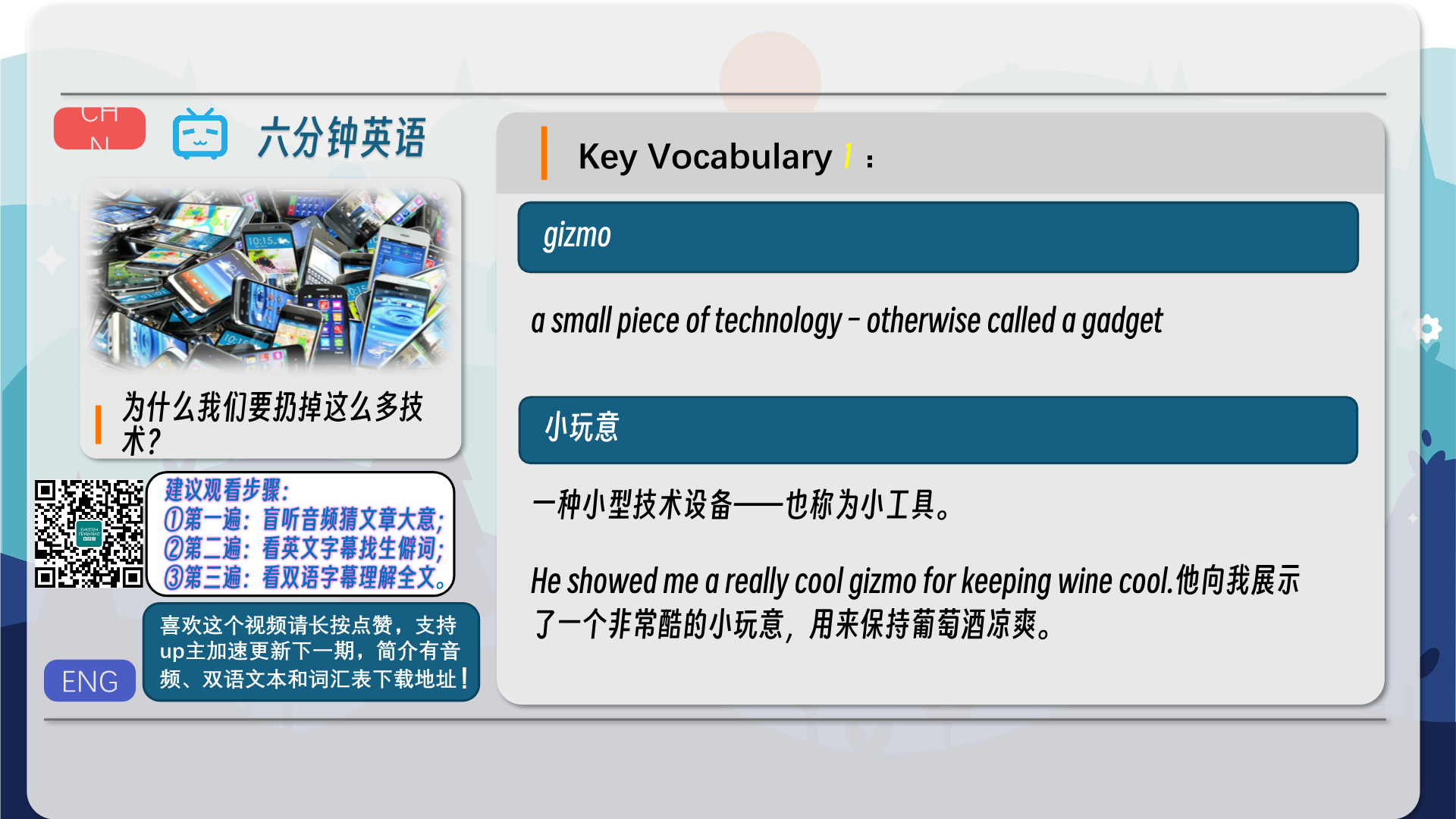
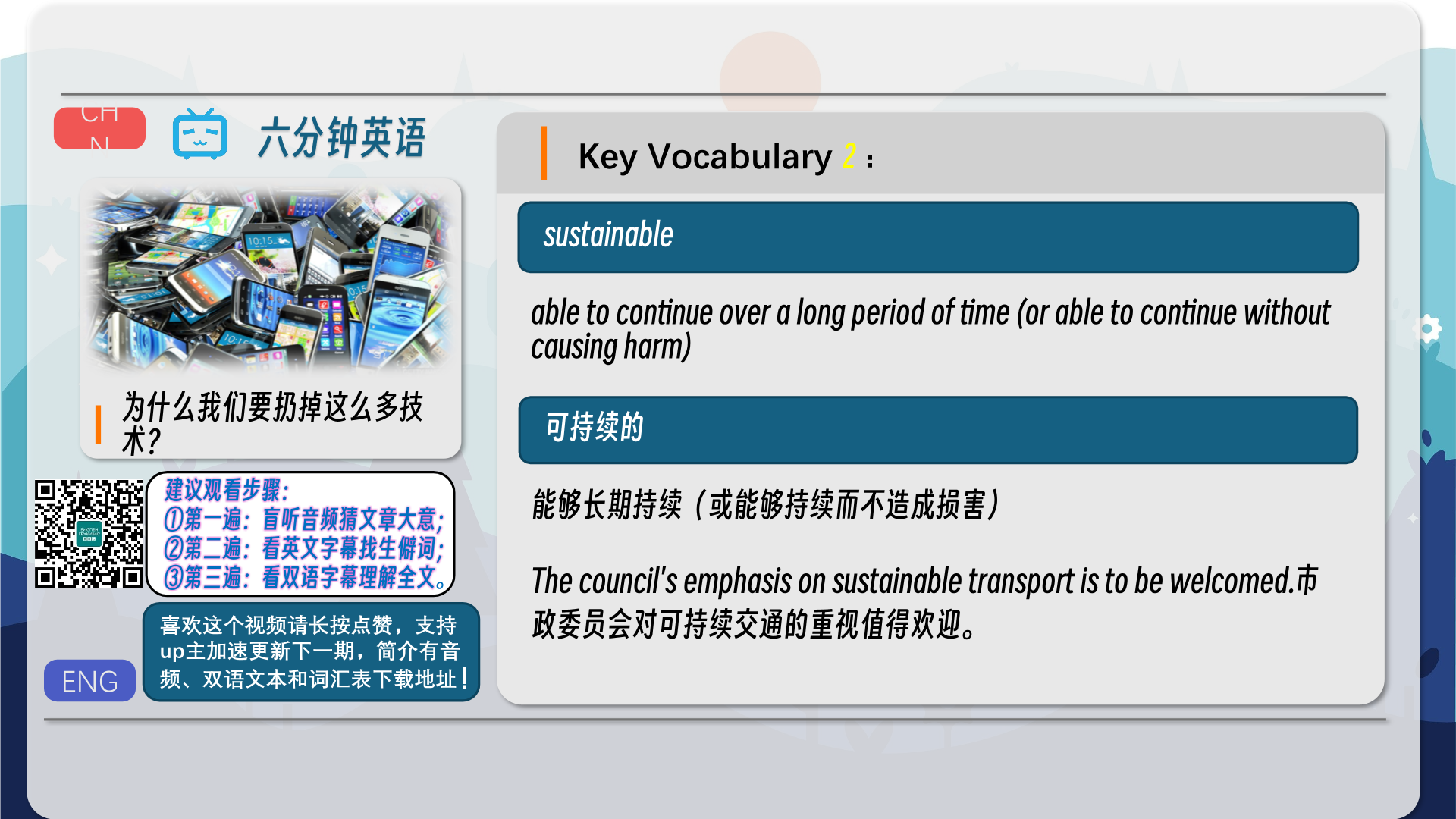
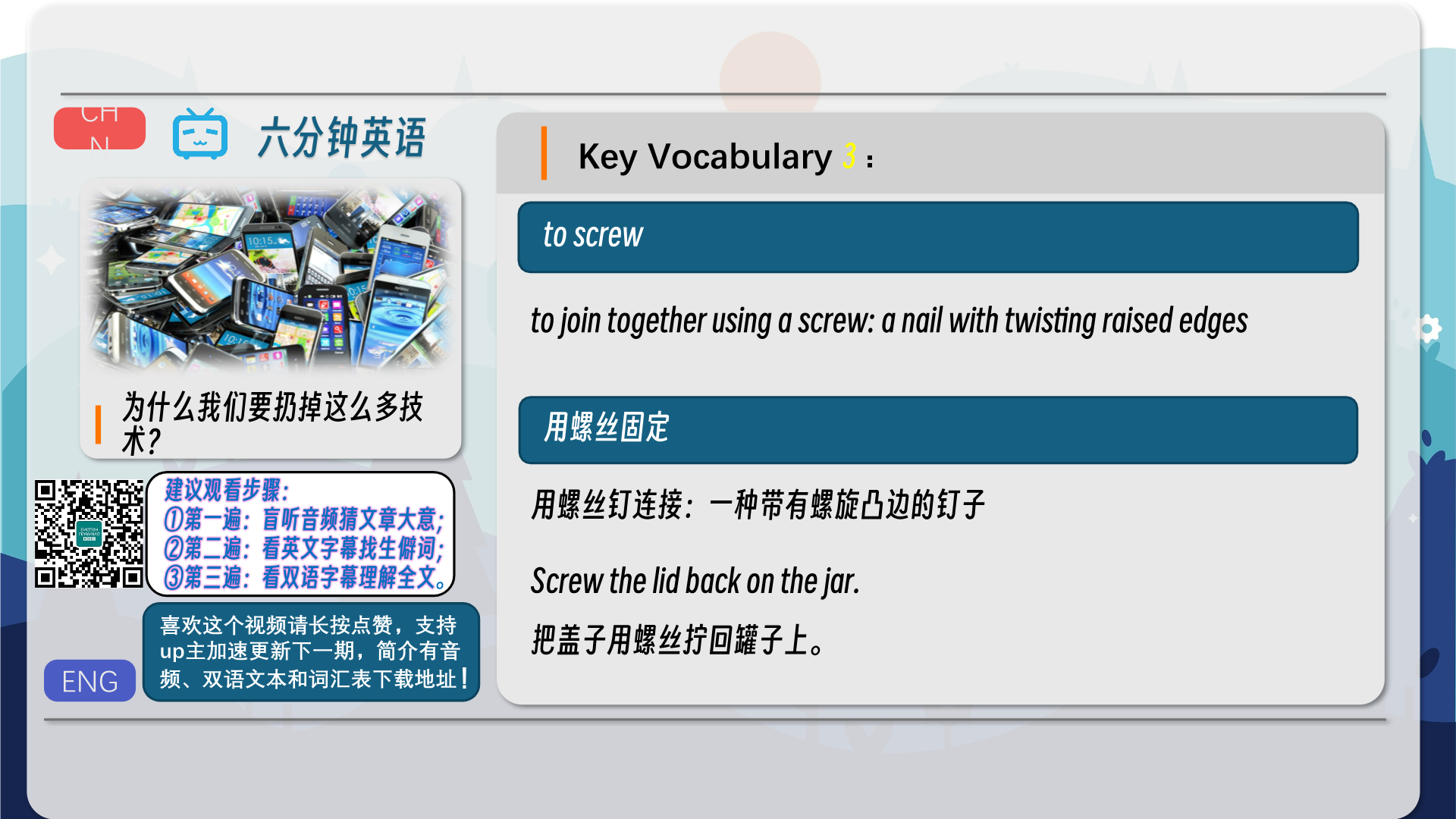
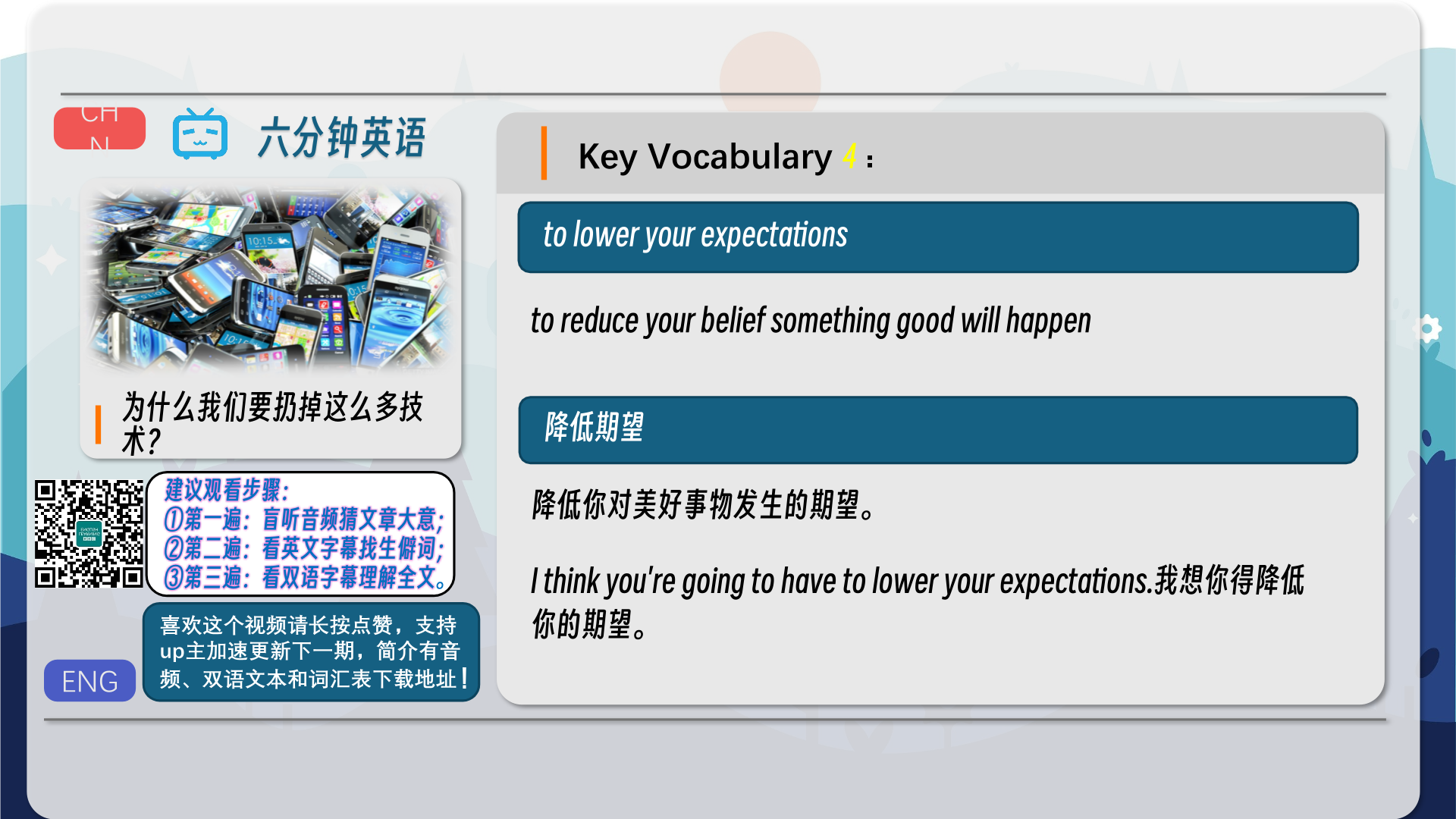
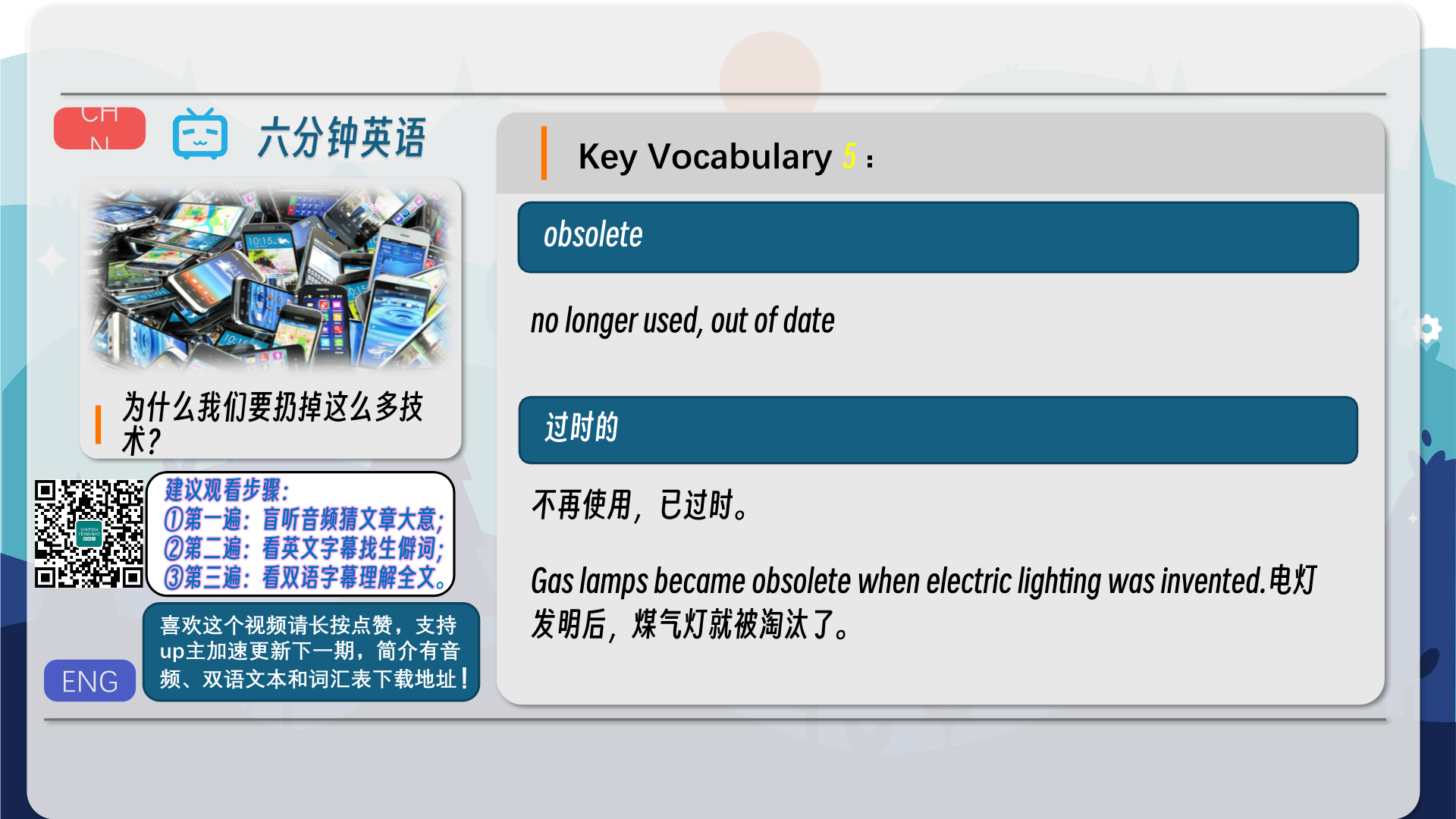
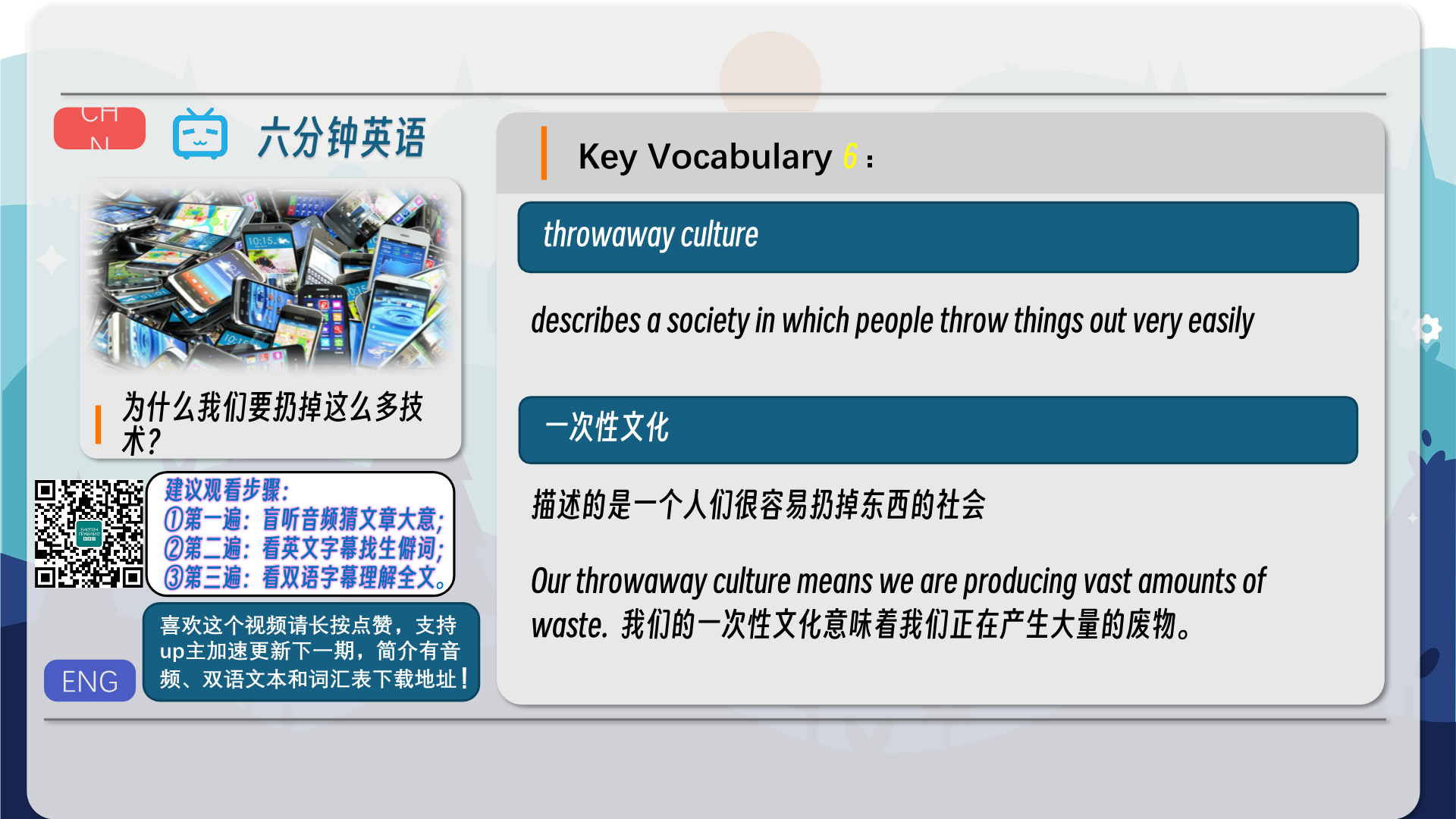
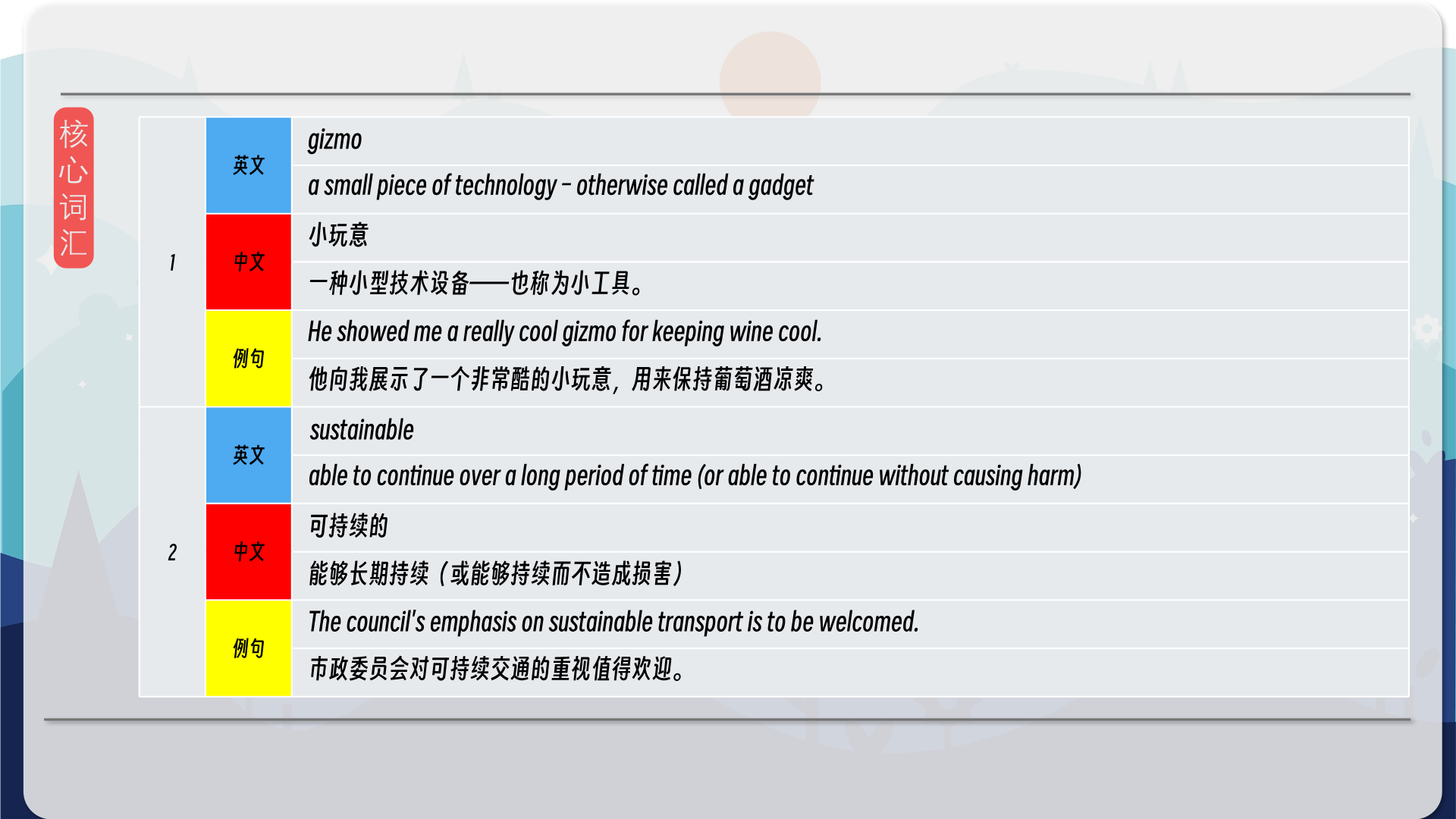
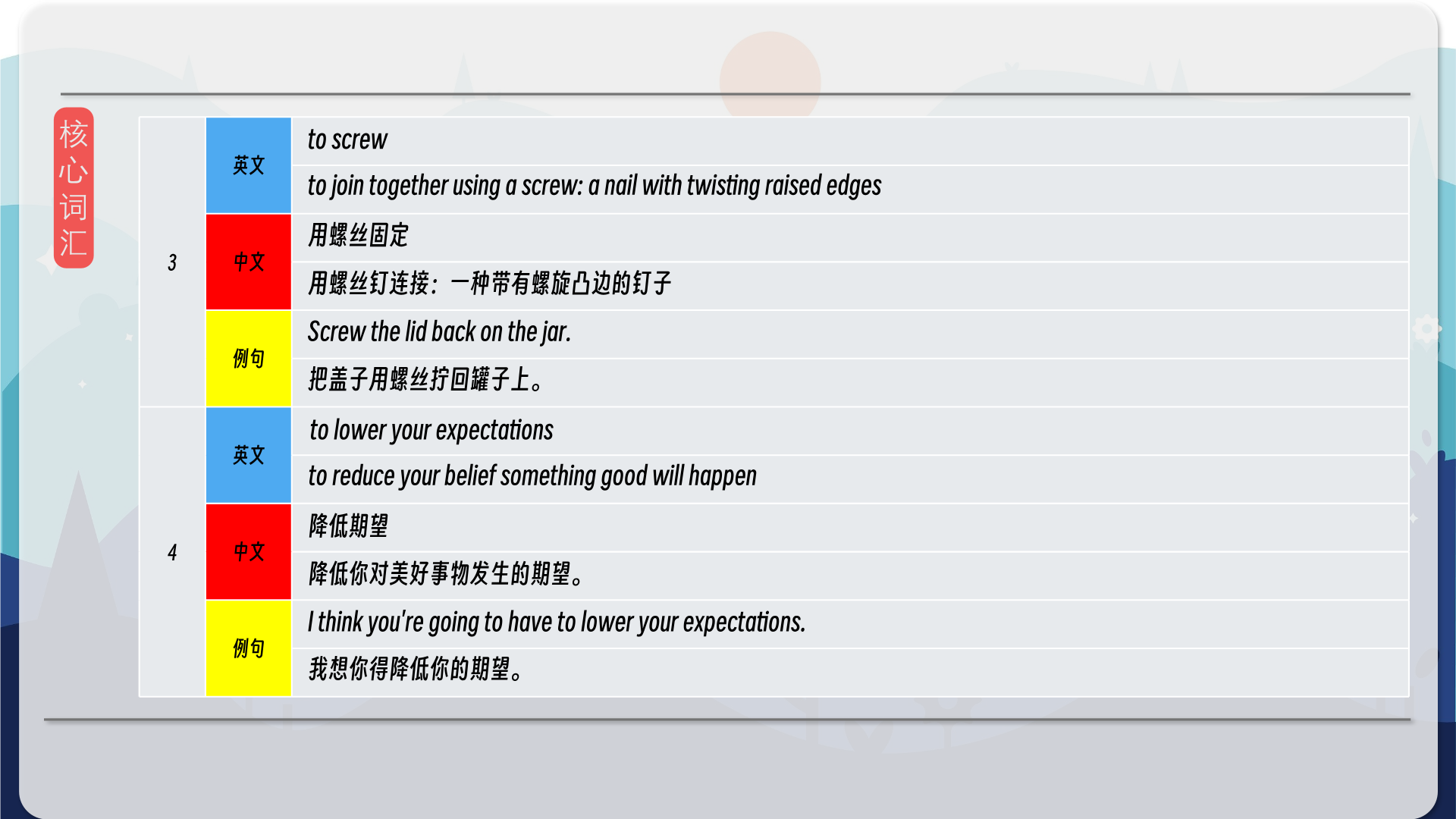
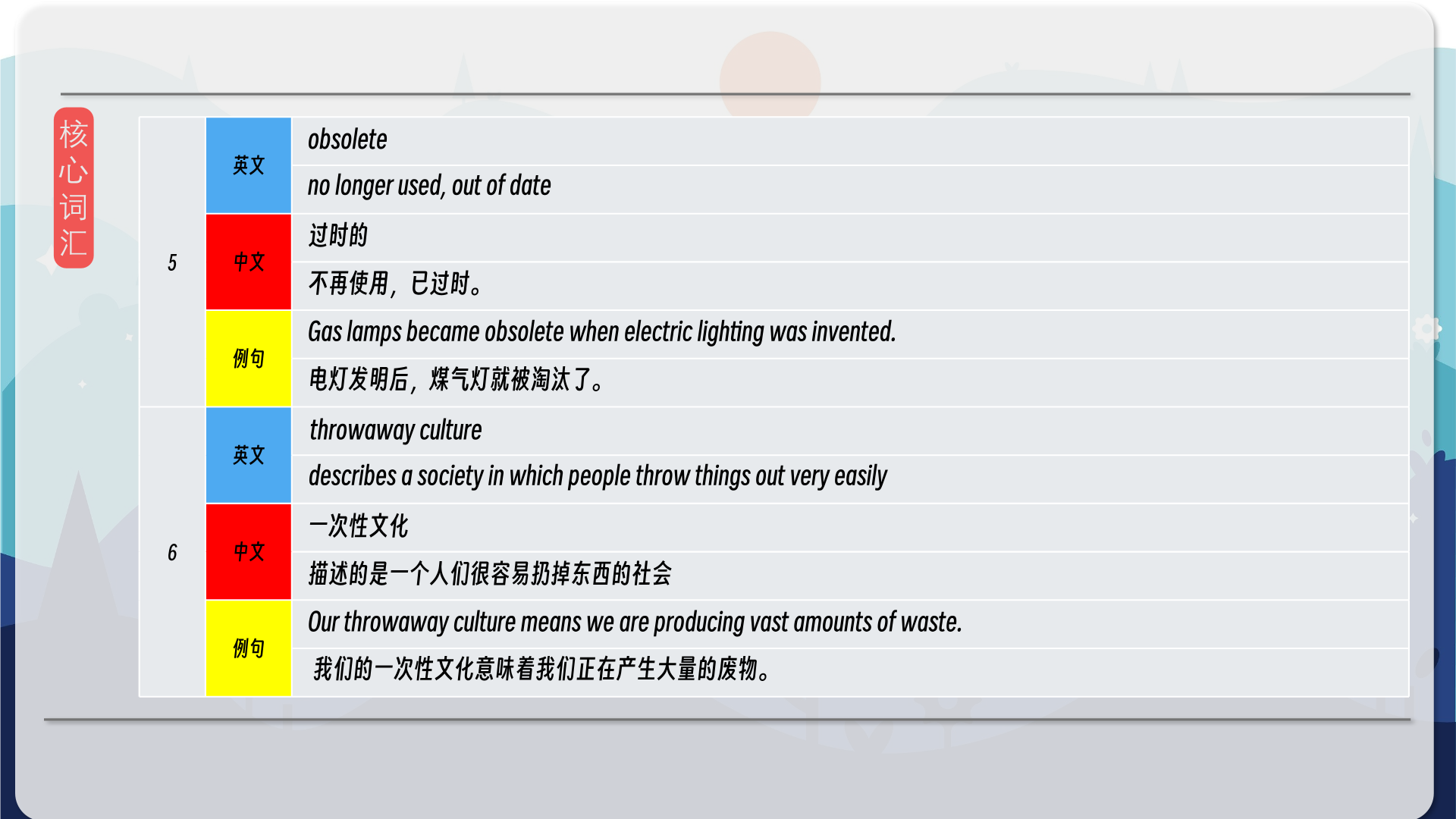
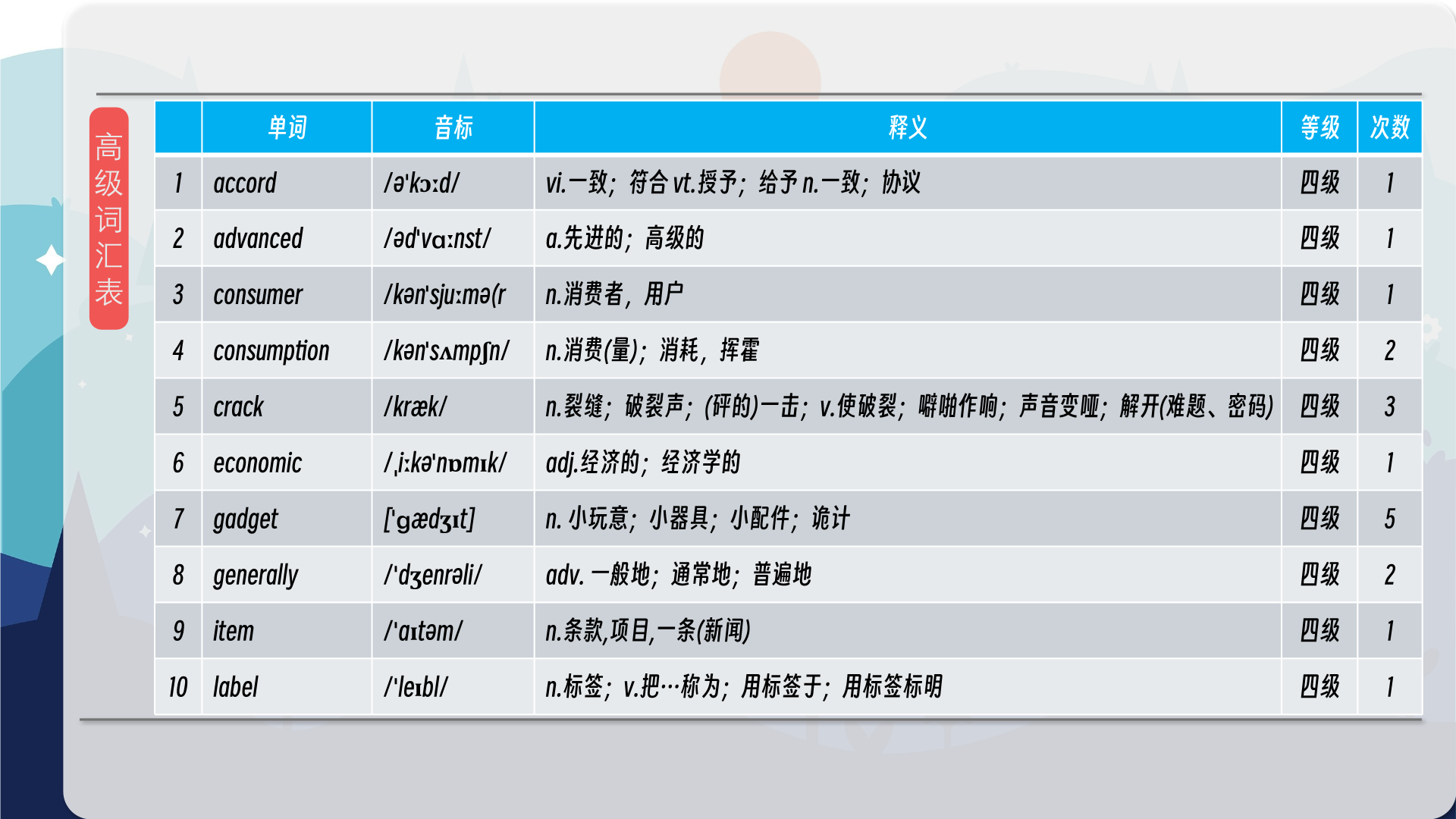
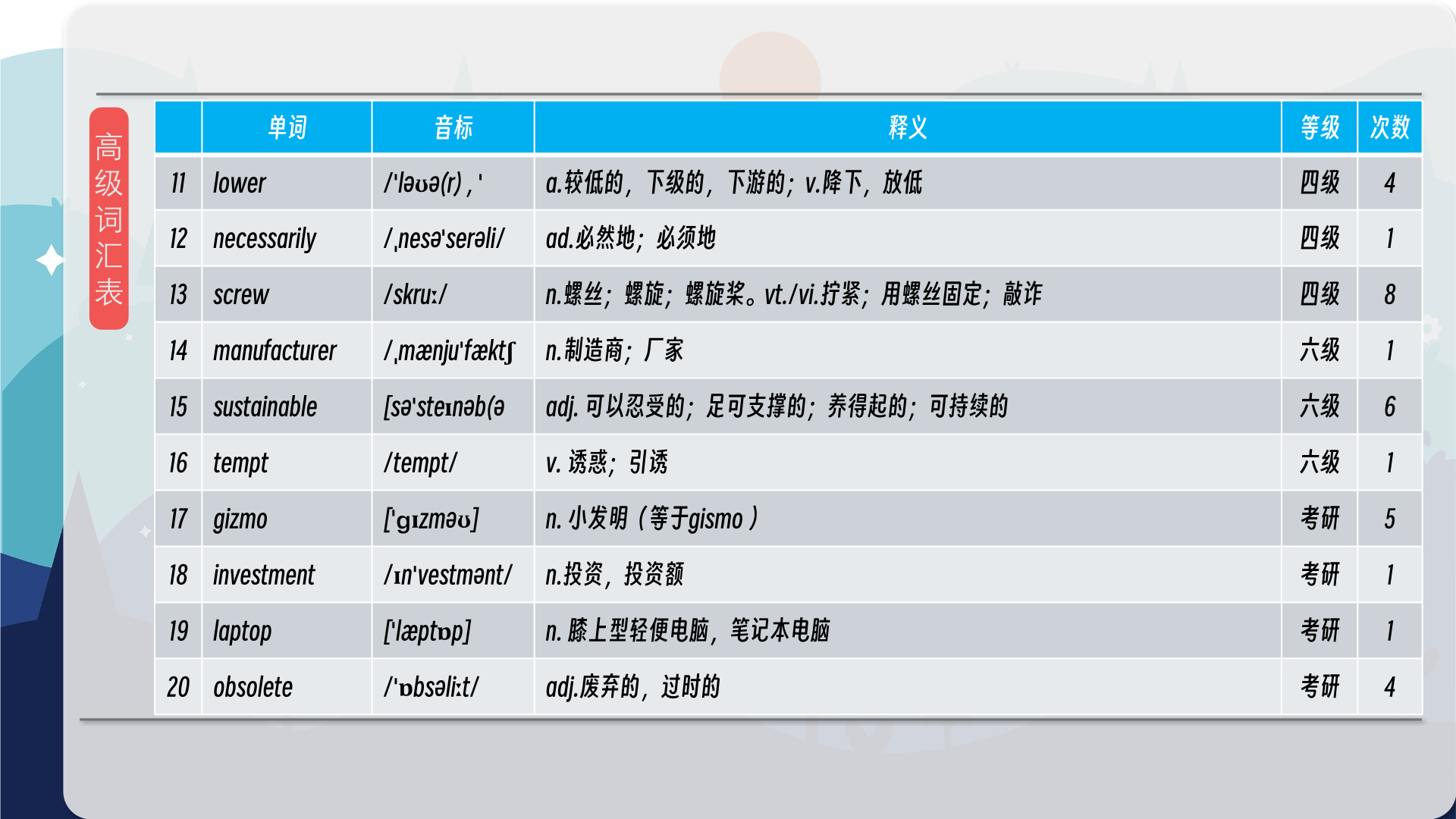
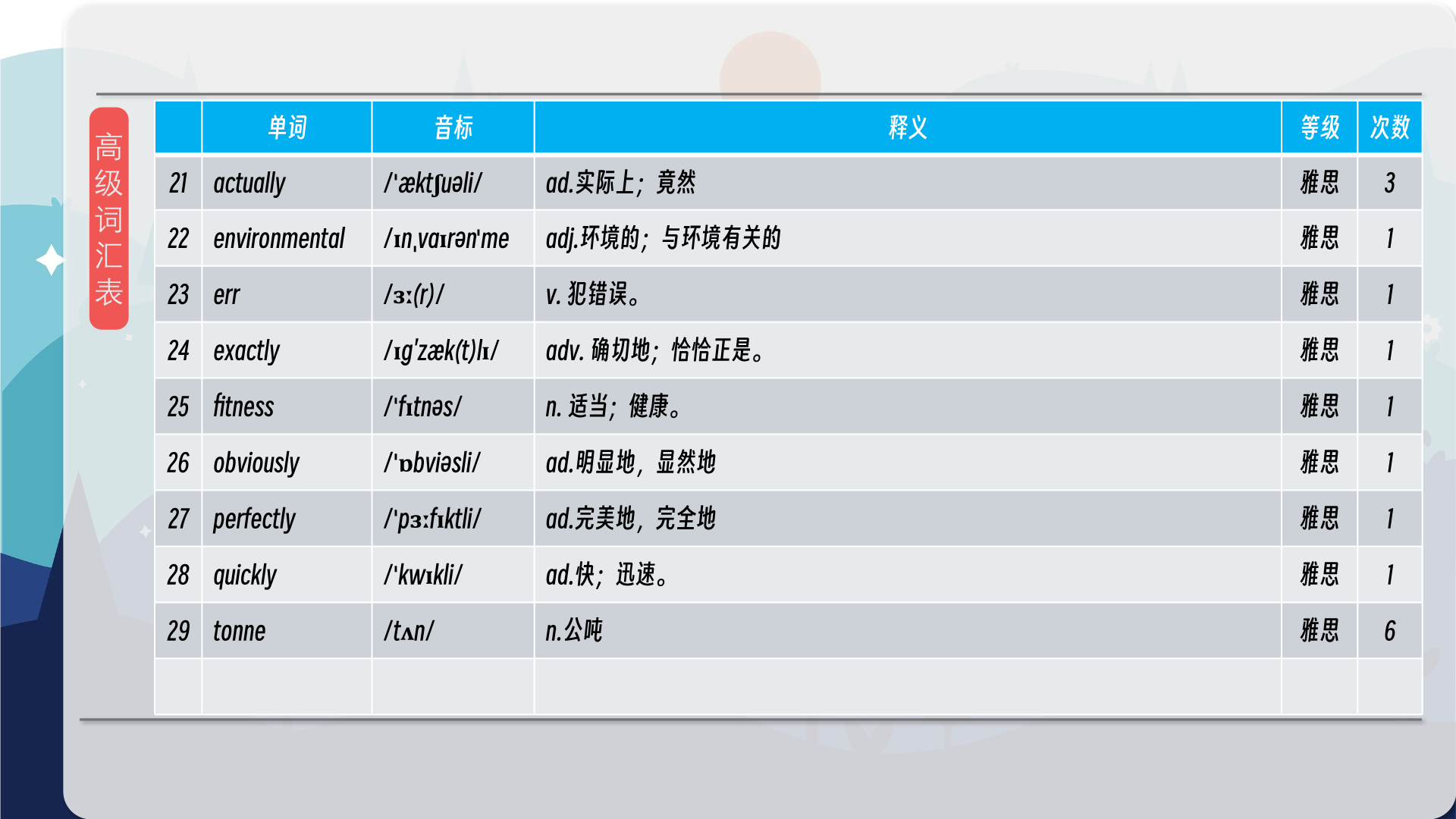

【核心词汇】
gizmo
a small piece of technology – otherwise called a gadget
小玩意
一种小型技术设备——也称为小工具。
He showed me a really cool gizmo for keeping wine cool.
他向我展示了一个非常酷的小玩意,用来保持葡萄酒凉爽。
sustainable
able to continue over a long period of time (or able to continue without causing harm)
可持续的
能够长期持续(或能够持续而不造成损害)
The council’s emphasis on sustainable transport is to be welcomed.
市政委员会对可持续交通的重视值得欢迎。
to screw
to join together using a screw: a nail with twisting raised edges
用螺丝固定
用螺丝钉连接:一种带有螺旋凸边的钉子
Screw the lid back on the jar.
把盖子用螺丝拧回罐子上。
to lower your expectations
to reduce your belief something good will happen
降低期望
降低你对美好事物发生的期望。
I think you’re going to have to lower your expectations.
我想你得降低你的期望。
obsolete
no longer used, out of date
过时的
不再使用,已过时。
Gas lamps became obsolete when electric lighting was invented.
电灯发明后,煤气灯就被淘汰了。
throwaway culture
describes a society in which people throw things out very easily
一次性文化
描述的是一个人们很容易扔掉东西的社会
Our throwaway culture means we are producing vast amounts of waste.
我们的一次性文化意味着我们正在产生大量的废物。
在公众号里输入6位数字,获取【对话音频、英文文本、中文翻译、核心词汇和高级词汇表】电子档,6位数字【暗号】在文章的最后一张图片,如【220728】,表示22年7月28日这一期。公众号没有的文章说明还没有制作相关资料。年度合集在B站【六分钟英语】工房获取,每年共计300+文档,感谢支持!